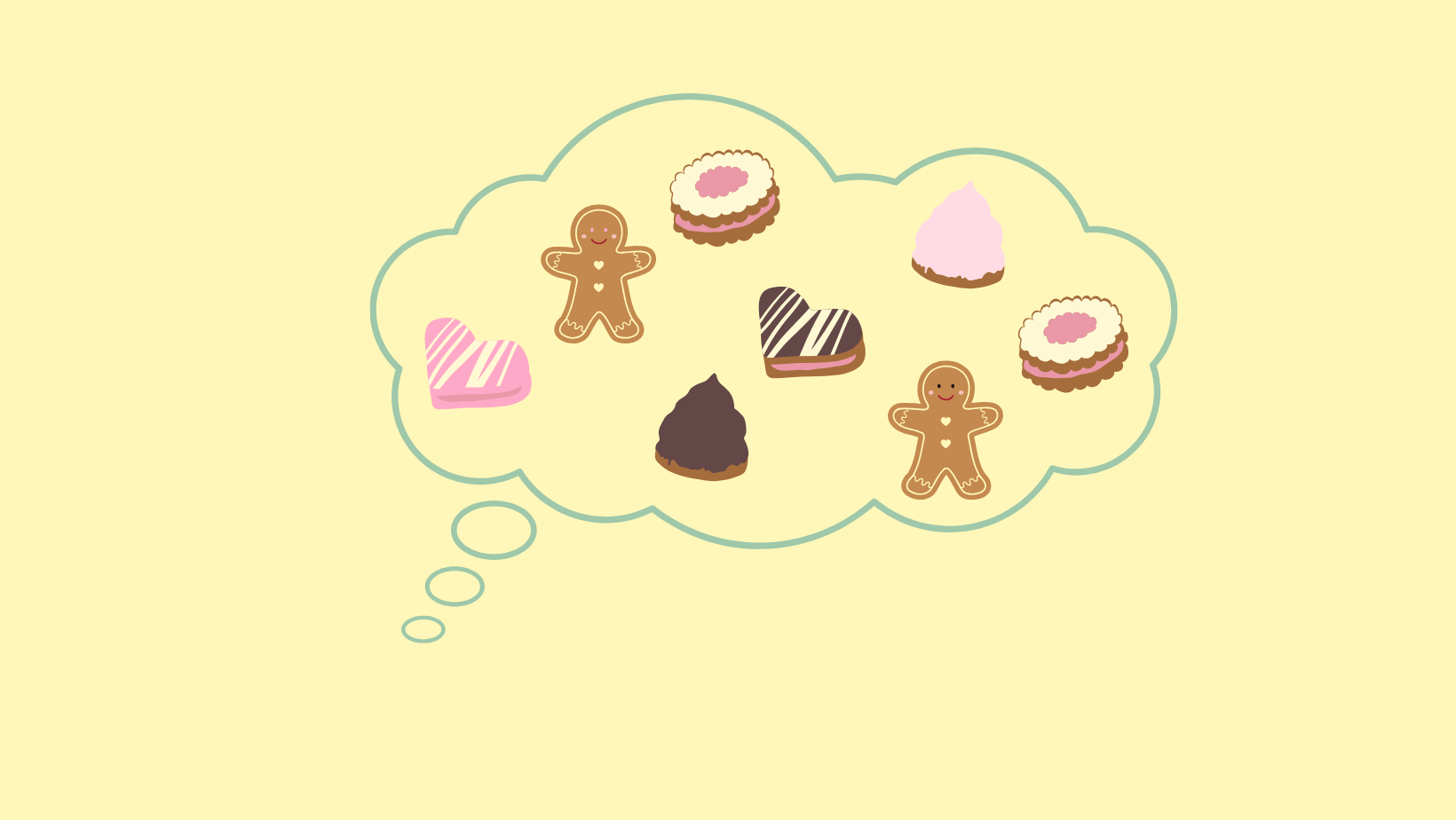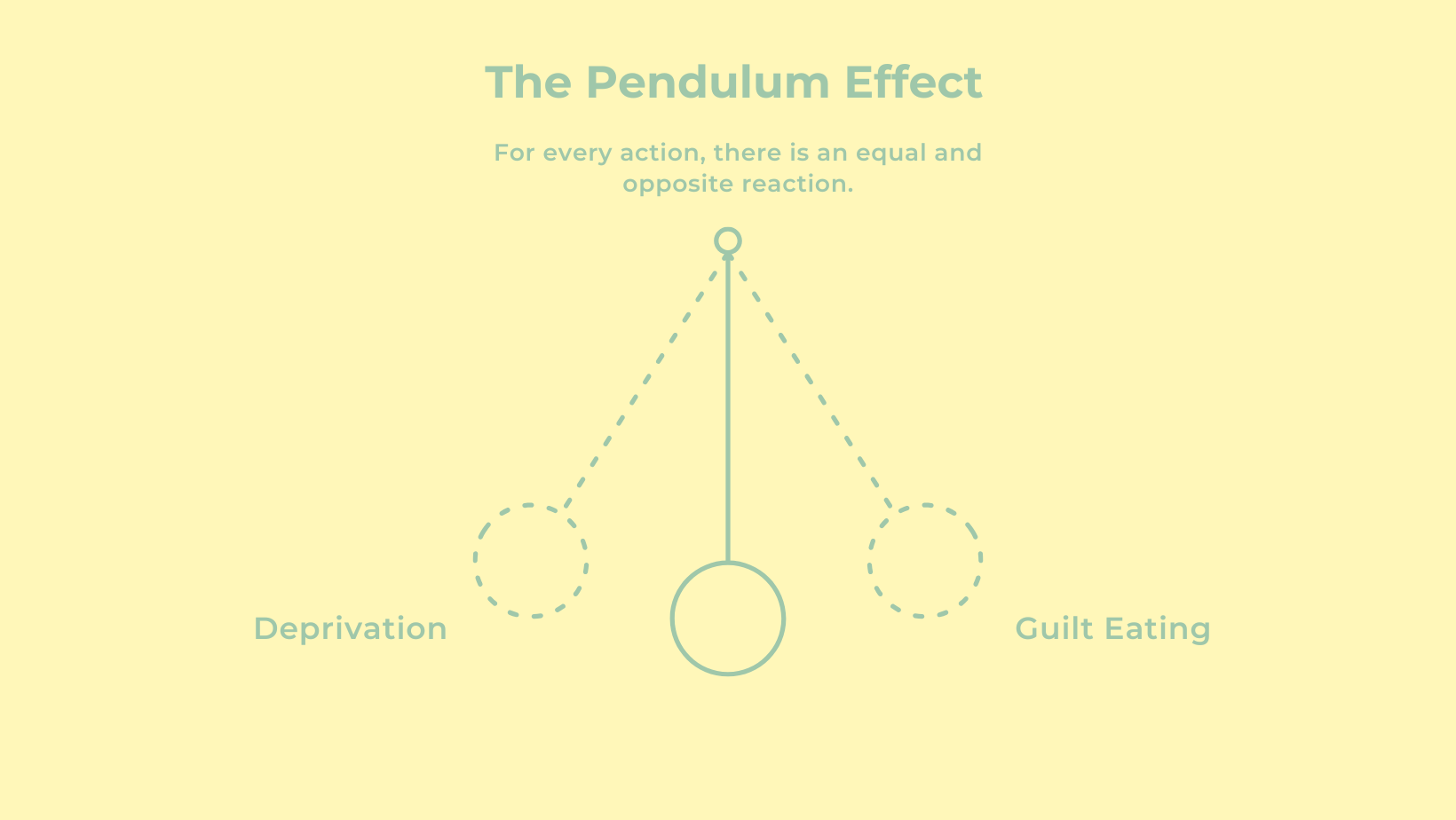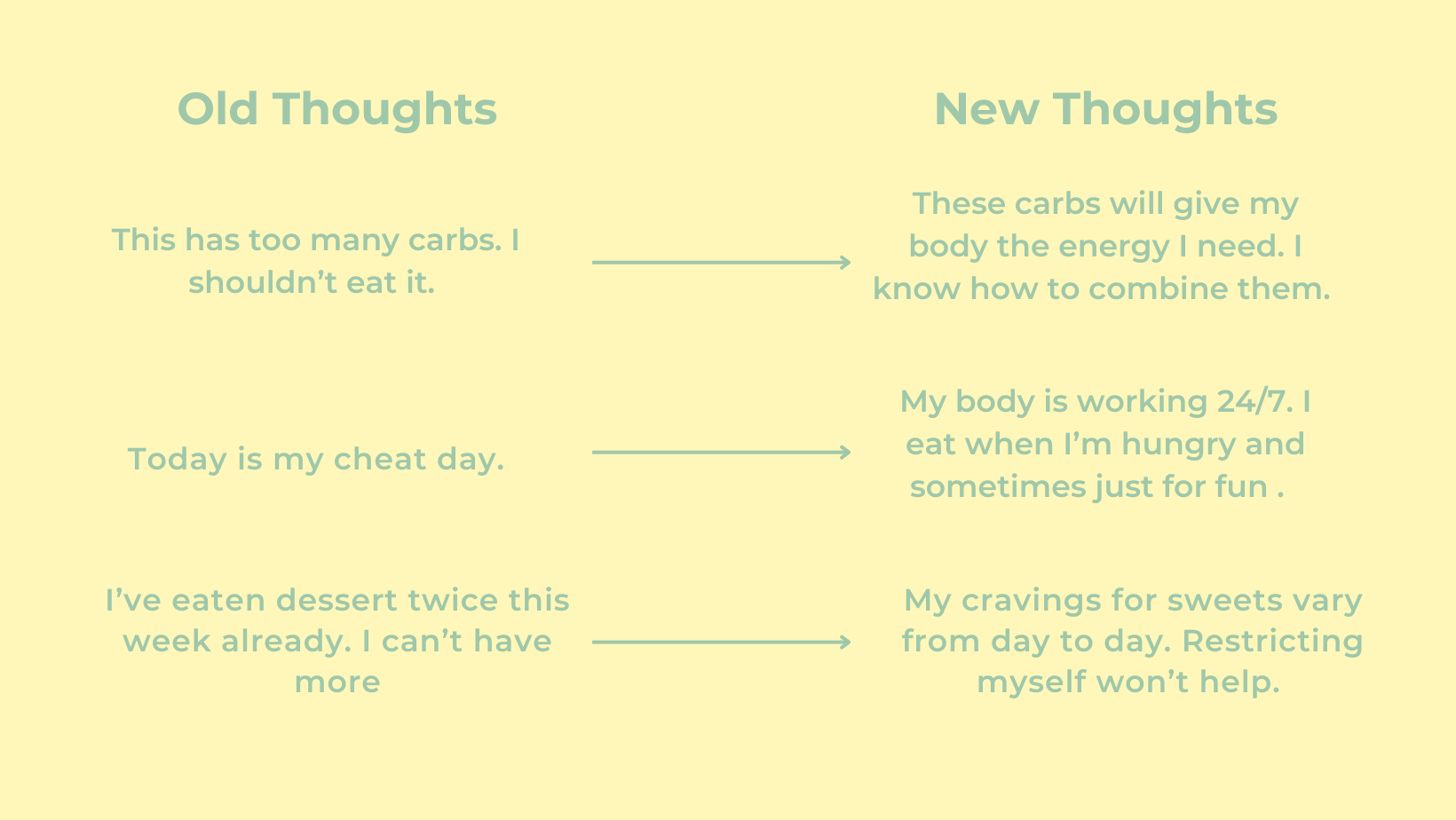Let's Rewrite The (Holiday) Food Script

Can you believe it’s already the holiday season? It feels like just yesterday I was juggling baby naps and summer sunshine, and now the cozy chaos of the holidays is here.
The other day, I read an article about prepping toddlers for the festivities. One tip that got me thinking was: teach your little one that lots of people will offer different foods, and it’s okay to say no. That advice really hit me—why don’t we remind ourselves of this too?
As adults, we often feel obligated to say yes to food we don’t even want—or, worse, battle guilt after saying yes to something we do want. That little voice pops up: “I shouldn’t eat this.”
Let’s rewrite that script together. I want to help you approach food with curiosity, joy, and confidence this holiday season—without guilt.
The Pendulum Effect
The more deprived we feel with food, the stronger the deprivation backlash, or what I call “guilt eating”. Our tight grip on food rules is hanging by a thread because it’s sustained by willpower and fear. As willpower is finite, the thread inevitably breaks because we become deprived not only of energy and calories but also of joy, emotional well-being and connection with ourselves and others. We begin to eat foods on the “bad” list, then we feel guilty and bad about ourselves, which triggers us to eat more. As they say: What we resist, persists!

This swing from deprivation to guilt eating feels like we’re spinning out of control. We blame our lack of discipline. But this is a mistake! Losing control is a natural, inevitable response to holding a restrictive, fearful grip. It’s the law of nature. For every action, there is an equal and opposite reaction.
Food science shows:
- Restricting foods often leads to overindulgence and weight gain later. Giving yourself permission to eat freely reduces the likelihood of bingeing.
- Dieting disrupts hunger hormones like ghrelin and leptin, making it harder to recognize when you’re truly hungry or full.
- Dieting triggers biological adaptations that actually increase cravings for high-calorie foods—the very foods often placed off-limits on a diet.
To stop the extreme pendulum swings, we must stop the deprivation and permit ourselves to eat. Once we trust that the mac and cheese or fries or cake will be available at any time, the urgency to eat them diminishes. By embracing intuitive eating, you can focus on enjoying the season instead of fighting food guilt.
How Your Approach to Eating Changes Over Time
Our relationship with food evolves through life’s seasons. Here’s how intuitive eating can support you, no matter your stage:
- In Your 20s-30s:
These years can feel like a whirlwind—career, relationships, or, in my case, navigating new motherhood. Diet culture tends to scream at you during this time, urging you to eat less, eat clean, or “earn” your food. But it’s also the perfect time to start building trust with your body. Learning to honor hunger and cravings now sets the foundation for a healthier, happier relationship with food. - In Your 40s-50s:
Hormonal changes during perimenopause and menopause can stir things up—more intense cravings, fluctuating hunger, and even changes in body composition. Did you know reduced estrogen can increase cravings for comfort foods? Instead of resisting these changes, intuitive eating invites you to approach your body with compassion and curiosity, honoring what it needs during this season of life. - In Your 60s and Beyond:
Food often becomes more functional at this stage—fueling energy, supporting health, and keeping you active. But that doesn’t mean the joy of eating disappears. Intuitive eating helps you tune into what nourishes and satisfies you, keeping food as a source of pleasure and connection, not just fuel.
No matter where you are, intuitive eating is a lifelong tool to tune out external rules and focus on what your body truly needs.
Busting the "I Shouldn’t Eat This" Mentality
We’ve all been there: standing by the dessert table, hearing that little voice whisper, “I shouldn’t eat this.” But where does that come from? Diet culture. And it’s time to let it go.
Here’s how to reframe:
- Replace “I shouldn’t eat this” with “Do I want this? How will it make me feel?”
- Remember, food is more than fuel—it’s connection, culture, and joy. And to be honest, baking, eating and sharing holiday cookies is a big part of something that brings me joy; especially around Christmas.
- Practice mindful indulgence: savor your favorite dishes, enjoy them fully, and stop when satisfied.
When I let go of labeling food as “good” or “bad,” I noticed I could enjoy it without feeling out of control. The freedom that comes with rewriting this narrative is worth it.
Tips for Practicing Intuitive Eating This Holiday Season
- Check in with Hunger: Eat balanced meals before events to avoid extreme hunger that can cloud your decision-making.
- Honor Cravings: If you’re craving that gingerbread cookie, go ahead! Enjoy every bite, guilt-free.
- Set Boundaries: When relatives comment on your plate (because they will), a simple, “I’m just enjoying what feels right for me,” can do wonders.
- Prioritize Satisfaction: Focus on the foods you love most and skip the ones that don’t truly excite you.
Rewrite Your Food Vocabulary
This holiday season, I challenge you to notice how you talk to yourself about food. When you catch yourself thinking, “I shouldn’t eat this,” pause.

You’re Not Alone
Can you believe we’re already here—amid the whirlwind of holiday gatherings and endless to-do lists? If this resonates with you, I'd love for you to share this newsletter so more people can rewrite their script around holiday foods.
Also, if you'd like to learn more about food scripts, the food police and intrusive thoughts, you should check out Dana Sowards's wonderful course around these thoughts.